
Indians have always liked gold a lot, and this has been true for a long time. India didn’t get its first gold exchange-traded fund until 2007, though (Gold BeES). Gold is the asset that these ETFs are based on. Gold ETFs also give you a way to invest in the gold market in India.
And this Diwali, when it is considered auspicious to invest especially in gold, you can buy its ETF on the share market with your Zebu trading account.
Exchange-traded funds (ETFs) for gold, also called gold ETFs, are open-ended mutual fund plans based on the price of gold, which changes all the time. There are a lot of costs involved in making real gold. Gold ETFs are a way for investors to get into the gold market. They are a great choice for long-term investors who want to beat inflation.
Gold is also a safer investment than stocks because it doesn’t change as much. Because of this, it gives you the chance to invest in gold and trade stocks. Some fund companies make money by buying and selling gold bullion. Because of this, they have to keep a close eye on the market. The price of real gold has a straight-line effect on how much gold ETFs are worth. Not only do they not skimp on purity, but they also make sure it is always available everywhere in the country.
Who should buy gold exchange-traded funds?
Gold ETFs could be a good choice for investors who want to add exposure to the gold market to their portfolios. It’s a low-risk investment that careful investors should look into. The money is used to buy standard gold bullion that is 99.5% pure. Gold ETFs are a low-risk investment, even though they are bought and sold on stock exchanges. People can buy gold ETFs instead of real gold if they don’t want to pay money to store it or pay extra taxes.
What Gold ETFs are and what they offer Flexibility
You can buy gold exchange-traded funds (ETFs) online and put them in your Demat account. The asset management company buys and sells them on a stock exchange (AMC). Even in the Demat format, gold ETFs act a lot like real gold.
Liquidity
Gold ETFs are very liquid because they can be traded on the stock market at the going rate during a trading session. Also, transaction costs, such as broker fees and government taxes, are lower than with real gold.
Smaller capital requirement
When you go into a shop, you will need a lot of money to buy gold. When you buy and sell gold ETFs, on the other hand, you can choose how much you want to buy and sell.
It’s easy to take part in the gold market
Gold exchange-traded funds give investors access to the open, successful, and safe gold market (ETFs). Also, they have a lot of cash on hand because gold is easy and quick to exchange.
Long-term investment
Gold ETFs are not subject to a wealth tax like real gold is. Safety and storage are also not issues with a Demat account. Because of this, you can keep your ETFs for as long as you want.
Tax-efficiency
Gold ETFs are a tax-friendly way to store gold because the profits they make are taxed as long-term capital gains. Still, sales tax, VAT, or a tax on wealth won’t make things harder.
Trading on a platform (NSE)
Investors in gold ETFs can trade in a clear way on the National Stock Exchange (NSE), which is a stock exchange platform.
Easy transactions
You can use it as security for loans and list it on the stock exchange to buy and sell it. Since there are no costs to enter or leave, transactions go more quickly and smoothly.
Risk elements
The NAV, or net asset value, of a gold ETF can go up or down with the market, just like any other stock fund. In a similar way, other costs, such as the fee for managing the fund, can also change the results.
This Diwali, if you are interested in investing in Gold, open a Zebu trading account and start investing today. It only takes 5 minutes.
